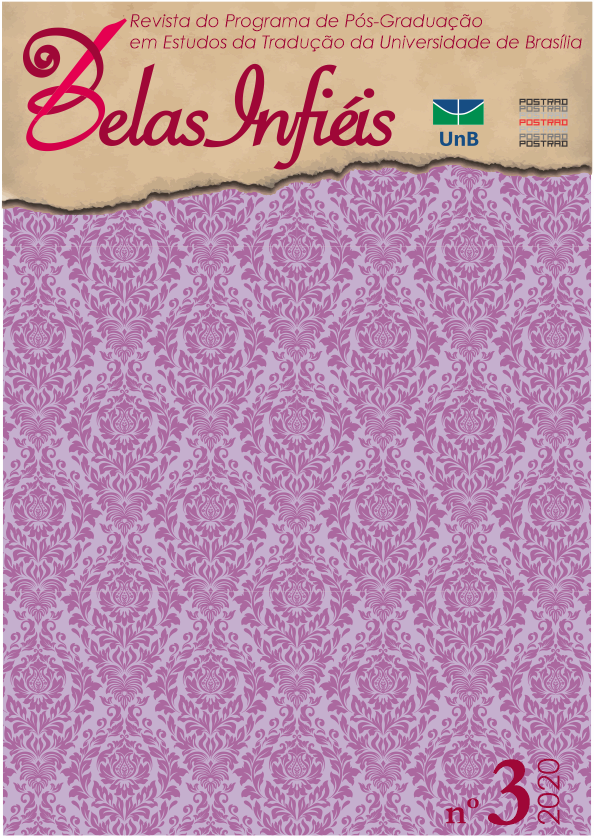Attempt to anthologize prefaces of Romanian translations of the 19th century
DOI:
https://doi.org/10.26512/belasinfieis.v9.n3.2020.30832Keywords:
Nineteenth century. Paratexts. Translation manifest. Faithful translation. Translation aims.Abstract
Insufficiently exploited in the history and historiography of Romanian translation, the prefatory discourse accompanying 19th century Romanian translations show the eclecticism of the approaches of Romanian translators in a period of transition that was troubled on all levels. Due to a corpus of a few dozen paratexts, we have traced out guidelines for the perception of the translating activity of the time, due to these testimonies of translators occasional or consecrated,, whose merit is to have been pioneers and to have made the Romanian readership discover the cultural productions from abroad. Despite of the lapses or misuses in the translations, the emphasis has been on the elements proving that the translated text does not represent a literal translation, but the translator's creation, the result of an elaborate, complex interpretative act (sometimes worthy of rivaling the complexity of the original itself). The clearly targeted orientation of the majority of the transpositions of foreign texts into Romanian, the interventions that are too sharp in relation to the source text where the adaptation goes from ethnocentrism to massive restructuring, both on the level of the signified and the signifier, allow us to classify them as derivatives of the translation itself. This article does not propose to make favorable or denigrating assessments of the performance of the translators on whom we have focused, but to highlight the existence of these mini-treaties of translation where translators verbalize, if not conceptualize, the difficulties of translating into a language that was by no means formed, completed and matured. However, the translator's prefatory discourse does not authorize criticism of his creation, which is subject to noble commitments such as nationalist awakening, the achievement of language, the development and organization of education. The self-reflexive inclination identified in the translator's metadiscourse and the desire to justify his translating options help us to trace the origins of translation criticism in Romania. Thus, from their theoretical and ideological content, some of the preface-manifests show that the translations of the 19th century are the result of hard work, a fierce determination and admirable ambitions to open up paths and to pave the way for others who will follow their example to do better.
Downloads
References
Cordonnier, Jean-Louis. “Aspects culturels de la traduction : quelques notions clé.” Meta : journal des traducteurs, no. 1, mars 2002, p. 38-50.
Cornea, Paul. De la Alecsandrescu la Eminescu. Aspecte, figuri, idei, Editura pentru literatură, Bucureşti, 1966.
Eliade, Pompiliu. Histoire de l’esprit public en Roumanie au dix-neuvième siècle. Tome premier : L’occupation turque et les premiers princes indigènes (1821-1828). Société Nouvelle de Librairie et d’Édition, Paris, 1905.
Hristea, Theodor. Probleme de etimologie. Studii. Articole. Note. Editura Ştiinţifică, Bucureşti, 1968.
Klimkiewicz, Aurélia. “La traduction et la culture du passage.” Meta : journal des traducteurs, no. 4, décembre 2005.
Ladmiral, Jean-René. Traduire : théorèmes pour la traduction. Gallimard, 2002.
Lascu-Pop, Rodica. “Interférences culturelles franco-roumaines (XVIIIe ”“ XIXe siècles).” Francofonia, no. 3, 1994, p. 87-97, https://rodin.uca.es/xmlui/bitstream/handle/10498/8151/17214968.pdf?sequence=1&isAllowed=y. Consulté le 9 avril 2019.
Lungu-Badea, Georgiana, coordenatrice. Un capitol de traductologie românească. Studii de istorie a traducerii (III). Editura Universităţii de Vest, TimiÅŸoara, 2008.
Lungu-Badea, Georgiana. Idei È™i metaidei traductive româneÈ™ti (secolele al XVI-lea-al XXI-lea), EdiÈ›ia a II-a, revăzută È™i adăugită. Editura Universității de Vest, TimiÈ™oara, 2015.
Nădejde, Ioan. “Limba literară.” Contemporanul, An V, no. 12, Tipo-litografiea H. Goldner, IaÅŸi, Iunie s.n., 1887.
Odobescu, Alexandru. “CondiÅ£iile unei bune traduceri româneÅŸti din autorii eleni ÅŸi latini.” Editura Librăriei H. STEINBERG, BucureÈ™ti, [1873] 1924.
Popovici, D. La littérature roumaine à l’époque des Lumières. Centrul de studii ÅŸi cercetări privitoare la Transilvania, Sibiu, 1945.
PuÅŸcariu, Sextil. Limba română. Privire generală, vol. I, Editura Minerva, BucureÅŸti, 1976.
Reiss, Katharina. La critique des traductions. Ses possibilités et ses limites. Traduit de l’allemand par Catherine Bocquet. Cahiers de l’Université d’Artois 23/2002, Artois Presses Université, Arras, 2002.
Tcherednitchenko, A.I., et Y.G. Koval. Théorie et pratique de la traduction. Kiev, 1991.
TorouÅ£iu, I. E., and Gh. CardaÅŸ. Studii ÅŸi documente literare. Junimea. Vol. I : Scrisori din anii 1867-1915 cătră I. C. Negruzzi. Institutul de Arte Grafice „Bucovina”, BucureÅŸti, 1931.
Downloads
Published
How to Cite
Issue
Section
License
Given the public access to this journal, the texts are free to use but requires the recognition of the original authorship and initial publication in this journal to be properly stated.
 The journal allows the use of works published for non-commercial purposes, including the right to submit the work to publicly accessible databases. Published contributions are the sole and exclusive responsibility of the author(s).Â



















